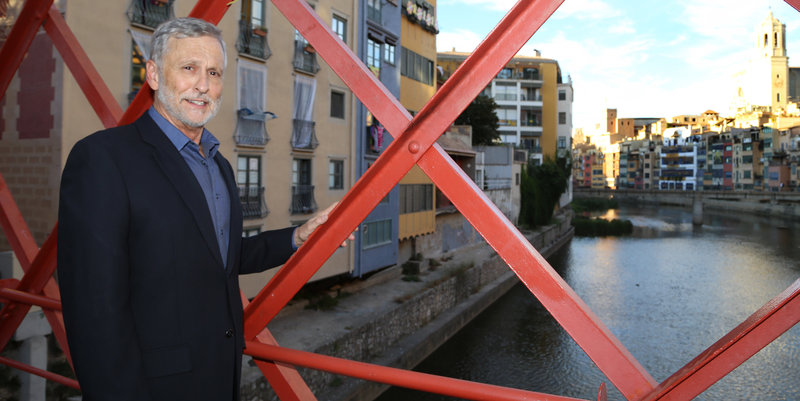The US professor of philosophy and international law, Allen Buchanan, recently visited Catalonia. An expert on the processes of secession, the professor thinks that Catalonia and Spain should try to engage in talks, although he also admits that it might already be too late. The professor, who has taught at Duke University in North Carolina, King’s College in London, and is now at the University of Arizona, is also the author of the book, Secession (1991), which explains his ideas of the phenomenon of break-away states. Buchanan says the reaction of the Spanish authorities to the October independence referendum was both violent and mistaken. He recognises the right to self-determination, but argues for Catalonia settling for greater autonomy. Buchanan also thinks that independence would bring with it unforeseen political and economic dangers.
What do you think about the situation in Catalonia?
It’s complicated, and what’s more serious is that there is a lack of trust between both sides, making it difficult to find an acceptable and agreed solution. I often think that the best solution is not complete independence but rather greater self-government. Having said that, I also think it is really hard to convince people on this point, when they feel frustrated with what has gone on in recent times. There was an attempt to develop certain aspects of self-government, but the Constitutional Court blocked these changes. It now seems that the Spanish government wants to talk, but there are people still in prison and in exile.
What should the next step be?
Mutual trust must be fostered. Perhaps opening the way for a new type of self-government. I think that the government in Madrid should start from scratch. They should release the prisoners and allow the exiles to return home, and then try to maintain dialogue so as to reach consensus as far as possible in satisfying the desires of Catalans. Spain is a type of federal state, but there are many types of federal systems. There’s one that is asymmetric, in which there are regions with more autonomous powers than others. There are a number of options to explore before a territory becomes independent. My concern is that perhaps this has not been explored enough.
You say it could already be too late... Different Catalan governments have tried to establish talks with Madrid.
The reaction of the Spanish government, which has shown such inflexibility, has caused a lot of citizens in Catalonia who were in favour of self-government to become supporters of independence. I think that the Spanish government has been its own worst enemy.
Because of the police violence on October 1?
Yes, for the way they reacted. The Spanish state could have been more politically able. It simply ignored the referendum and insisted that it wasn’t legal, but it reacted with violence and I think that damaged the trust needed for finding a solution. The only way to unblock this situation is to get a third party involved, who can act as a neutral. Yet, once again, I don’t know if it is too late to begin this mediation. The European Union would be the natural option, but it refuses to get involved in the conflict because it believes that other European countries – which also have their own independence movements – could then want to follow this same path. The European Union has other problems and at the moment is showing its weakness.
Do you think this is the reason why Europe has not intervened in the conflict between Catalonia and Spain, or because it doesn’t want to get involved in an “internal matter”?
I think it’s both things at the same time. I think the European Union is showing weakness on this point, while it also has other fronts open and this is not the most important of them. Moreover, we also have to realise that the European Union is made up of states, and these states are against the idea of breaking up states. Unfortunately, I think that will continue; if there is a third party to mediate it won’t be the European Union. It could be a group of respected figures from different countries.
There is strong support for independence in Catalonia.
It is understandable that after getting to this point people should idealise the benefits of independence without wanting to see the downsides. We have seen a similar thing with Brexit. The people who voted to leave the European Union only thought about the benefits it would bring. And now they are rethinking it. I believe that it is natural that when you are involved in a movement you should tend to think about the benefits it will bring. While it might offend some people, it has to be said that having one’s own state does not solve all your problems straight away. There will be corruption, social problems to face... I witnessed the latest pro-independence demonstrations in Catalonia and they seemed genuinely peaceful to me. And that is a good thing. But you never know when a peaceful movement might turn violent. Sometimes no one wants violence, but you can get into a downward spiral. What I’m saying is that right now it seems to be a civic and peaceful moment, which is a good thing, but as people become more emotionally involved you never know what might happen.
Can the referendum agreed between the United Kingdom and Scotland serve as an example for Spain and Catalonia?
It is a good example. A government that is more flexible and that does not try to criminalise the independence movement! In Scotland, people ended up saying: “After all, we are not so badly off! Let’s stay!” On the other hand, in a hypothetical case in which independence is proclaimed, I think it has to be on the back of a very clear process which, above all, respects the rights of the people who are not in favour, of the new minorities that would be created by independence. In other words: to be sure there will be no discrimination towards people who voted against it. And for Spanish to continue to be an official language.
What mistakes has the independence movement made?
I think it is a little too simplistic to think that independence can be achieved with a referendum passed with a simple majority. What we have seen in the case of Brexit is that a referendum that passes with a simple majority is not enough to justify such a large change. For Catalonia to split from Spain is a major change, just like Great Britain leaving the European Union. What I believe would be appropriate if the path of independence is pursued is for there to be a two-stage referendum, with very clear questions. In other words, a referendum before and after, with a second referendum 18 months later. This way would leave enough time for people to think about what exactly the costs and benefits are. I think that for a change of this magnitude to make any sense, there needs to be a super-majority in favour of it, like two thirds of voters in favour. People need to have time to reflect on the different economic and political risks independence might bring to a country.
Yes, but the situation in Catalonia is complicated, with political prisoners and with president Puigdemont and some former ministers and politicians in exile...
That is why there has to be another attempt at dialogue with the State! And one of the conditions before doing that is releasing the prisoners. Because while there are politicians in prison or in exile, I can imagine that if I was Catalan I would be very sceptical when it came to negotiations, because the message it gives while they are in prison or exile is that the Catalan proposals are illegitimate.
Pedro Sánchez’s Socialist government does not seem willing to negotiate. Do you think his executive is more worried about cleaning up Spain’s image before the international community?
I get that impression. I think that the Spanish government is too rigid. It is too inflexible, and that hinders things and make people in Catalonia decide that they have had enough of this situation, and that the only way to achieve their objectives is managing to get independence. Moreover, what is extremely complicated is that while the government has executive power, and in the case that it makes a decision, behind it are the courts making talks even more difficult.
So the conclusion could be that there is no separation of powers in Spain?
I have heard people state that, but I am not an expert on the Spanish Constitution, so I can’t tell you whether that is true or not. There are some countries in which judicial and executive power go together, which then makes it really complicated to make any changes to the Constitution. There are cases of states that have come under pressure from other national communities. Sometimes that has been resolved with independence, and at other times, it hasn’t.
Can you give us an example?
Norway achieved independence from Sweden [in 1905] with the support of powerful players in the international community. At the time, the Norwegian parliament sent a message to Sweden that it would not be a good idea to use violence against the regions that wanted to break away. If you want an independent country, it is vital to get the recognition of other states. And how do go about gaining independence? With influence, with the reactions of other states, knowing they will recognise you in the future, that they will help you during the transition... You should not only think about the reaction of the government in Madrid, but also that of other states, and that is also something that is very difficult to do.
interview
interview Allen Buchanan










